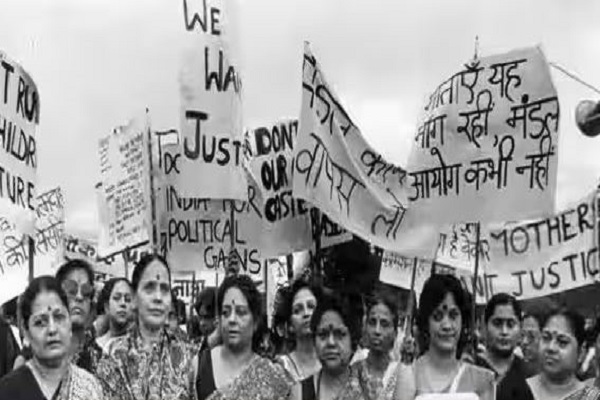(Guru Prakash)
Khusrupur, a small village near Patna, was in the news recently as a woman from the Dalit community was made to suffer the insufferable. Last month, she was reportedly stripped, and subject to unprintable humiliations because her husband had taken a loan worth Rs 1,500 and had not paid the interest to a local moneylender who belonged to the dominant OBC community. This unfortunate event was not sufficiently covered by the mainstream media and it did not receive the attention it deserved. On meeting the victim, I experienced a deep sense of anxiety as the aggrieved was seemingly in a state of shock and unable to speak or comprehend the horrors she underwent.
An equally unfortunate incident happened on the streets of Ujjain in Madhya Pradesh where a young girl was spotted on the move seeking help in a severely disturbing state. Rightfully, this was tweeted and discussed by leaders across the political spectrum. The accused in this case has been nabbed by the Madhya Pradesh police. The worrying distinction between Khusrupur and Ujjain is the absolute lack of empathy from a section of our political establishment. There are stark memories of the photo-op visit of the first family of the Congress party to Hathras, and the narrative paraphernalia that accompanied the trip. There was a tweet by Rahul Gandhi about the Ujjain incident. But there has been disconcerting silence from the senior leadership of the Congress about the Khusrupur case. This is telling. Creating an artificial distinction between marginalised sections on the basis of the states and the political party ruling the state is unpardonable in a constitutional democracy like ours.
The Malaise is deeper
Sonia Gandhi was seen leading the charge of the Opposition on the Nari Shakti Vandan bill that has now become a law after receiving the presidential assent. This can be a template for more progressive reforms in the future where long pending reforms are transformed into legislation at such an encouraging pace. Gandhi leading the Opposition came as a surprise to a number of keen political observers.
*Those Congress Cannot See*
For long, the unvoiced and the unheard were treated as a commodity in the political discourse. https://t.co/NucFhDuWNf pic.twitter.com/Z9wsgNmiam
— Dr. Guru Prakash Paswan (@IGuruPrakash) October 18, 2023
The Nehruvian “consensus” was and is not accommodative of socially and educationally backward communities. As Professor Surendra Mohan noted in Mainstream Weekly in 2010: “…there was the issue of preferential opportunities for the backward castes. Lohia had been referring to several Articles in the Constitution providing for it and was appalled when Nehru rejected the report submitted by the Kaka Kalelkar Commission appointed to make recommendations on that behalf. He was keen that the substance of political power and public employment is shared by the SE/BCs and they be provided opportunity of equality, Lohia strove for a people-oriented and democratic administration.” Then there was the official demise of the first-ever Backward Classes Commission, also known as the Kaka Kalelkar Commission, which advocated for radical representation of the weaker sections.
Rajiv Gandhi opposed the recommendations of the Mandal Commission. While commenting upon the Commission he said, “that this operation is not scientific, is not technically sophisticated and it is not even academically satisfying.” He added that “You have taken the country to the edge of caste wars… We have problems if caste is defined to enshrine casteism in our country.”
In a recent report by a scholar from the Tata Institute of Social Sciences, it was revealed that historically, Congress has not risen to the occasion when it came to sharing power. A caste-wise, party-wise analysis shows that the BJP has had the highest share (30.9 per cent) of OBC CMs, while this number is the lowest for Congress (17.2 per cent). The share of non-Congress non-BJP parties among OBC chief ministers is 28 per cent.
For long, the unvoiced and the unheard were treated as a commodity in the political discourse. The elevation of Droupadi Murmu, the first woman from a marginalised community, to the highest constitutional office in the country, has brought a fundamental transformation in the aspirations of marginalised communities. Arjun Ram Meghwal is the only Dalit after B R Ambedkar to become Law Minister. These elevations have had a massive impact. Ilaiyaraaja is the first Dalit person to reach the Upper House of the Bharatiya Parliament as a presidential nominee – and this too has sent a message.
Representation and dignity have been in political vogue for the last few years. This is in line with the thoughts of Deendayal Upadhyaya, an original Indian thinker and political philosopher. His philosophy of integral humanism and Antyodaya — the rise of the last person in the line — has been the guiding philosophy of the present dispensation.
(The writer is Assistant Professor of Law at Patna University and National Spokesperson, BJP)

